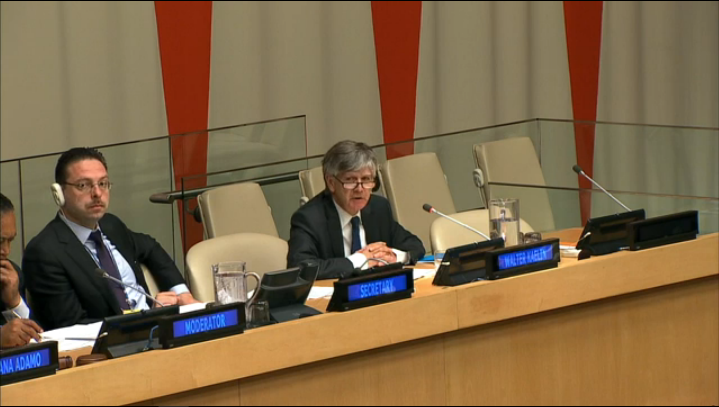On 23 May 2017 the UN General Assembly held a panel discussion on the ‘Adverse effects of climate change and natural disasters as drivers of migration’. As part of its thematic session[1] to inform the negotiation of the global compact for safe, orderly and regular migration (the global compact).
The Panel included presentations from:
- François Gemenne, FNRS Senior research associate and Director at the University of Liège
- Susana Adamo, Research scientist at the Center for International Earth Science Information Network (The Earth Institute, Columbia University)
- Professor Walter Kaelin, Envoy of the Chairmanship of the Nansen Initiative
Panellists and interventions from the floor covered the importance of including climate displacement in the global compact. They noted that there were a number of linked agreements and frameworks in place, including the Nansen Agenda for the Protection of Cross-Border Displaced Persons in the Context of Disasters and Climate Change and the Sendai Framework. Parties also noted that existing human rights law frameworks should be recognised and that the core challenge of the compact in relation to climate displacement was to guarantee respect for human rights of those persons who move due to climate change. A number of Parties were also clear in their interventions that the most important action that can be taken is the achievement of the Paris Agreement’s goal to hold the increase in the global average temperature to well below 2 °C above pre-industrial levels and pursuing efforts to limit the temperature increase to 1.5 °C, will significantly reduce the number of people who are required to move due to climate change.
The Mary Robinson Foundation – Climate Justice has been engaged in the process of the global compact since its inception in September 2016. As part of this engagement, the Foundation, in conjunction with OHCHR, held a climate justice dialogue in the week prior to the thematic session. The dialogue was on ‘Human Rights, Climate Change and Migration in the context of the global compact for safe orderly and regular migration’. In the dialogue parties recognised the complexity of the issue of climate displacement and made a number of recommendations including;
- The inclusion of climate change as a driver of displacement, and an acknowledgement that human rights must underpin policy outcomes addressing climate-induced movement of persons, will be critical elements of a global compact that is forward looking and robust.
- A climate justice approach, built on human rights principles and responsibilities, should form the basis of the global compact’s response to climate displacement.
- The voices of those displaced by climate change should be incorporated into the consultation processes going forward. It is these voices that have the experience necessary and lessons learned necessary to deliver positive outcomes to climate displacement events in the future.
- Countries, regional organisations and the United Nations should make efforts to improve data collection and methodology to identify communities at risk of slow and sudden onset climate displacement. The compact should include an objective of improving international understanding and data collection of this issue.
The Foundation was pleased to see these points reflected in country and stakeholder interventions as part of the UN panel discussion.
The Foundation believes that these interventions, as well as the engagement of impacted communities in the discussions will assist in delivering a global compact in 2018 that engages with the key issue of climate displacement with a firm grounding in the human rights of the displaced. Such an outcome would be consistent with the principles of climate justice and ensure that the global compact is consistent with the goals of the Paris Agreement and Agenda 2030.
[1] The thematic session was entitled: ‘Addressing drivers of migration, including adverse effects of climate change, natural disasters and human-made crises, through protection and assistance, sustainable development, poverty eradication, conflict prevention and resolution.’
Related Links
Our Work – Protecting the Rights of Climate Displaced People: A Position Paper


